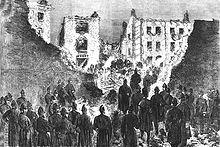This article includes a list of general references, but it lacks sufficient corresponding inline citations. (December 2012) |
| Clerkenwell explosion | |
|---|---|
 The House of Detention in Clerkenwell after the bombing; seen from within the prison yard | |
| Location | Clerkenwell, London, England |
| Date | 13 December 1867 (GMT) |
Attack type | Explosion |
| Weapons | 200–548 pounds (91–249 kg) Gunpowder kegs[1] |
| Deaths | 12 |
| Injured | 120 |
| Perpetrator | Irish Republican Brotherhood |
The Clerkenwell explosion, also known as the Clerkenwell Outrage, was a bombing attack carried out by the Irish Republican Brotherhood (IRB) in London on 13 December 1867. Members of the IRB, who were nicknamed "Fenians", exploded a bomb to try to free a member of their group who was being held on remand at Clerkenwell Prison. The explosion damaged nearby houses, killed 12 civilians and wounded 120; no prisoners escaped and the attack was a failure.[2] The event was described by The Times the following day as "a crime of unexampled atrocity", and compared to the "infernal machines" used in Paris in 1800 and 1835 and the Gunpowder Treason of 1605. Denounced by politicians and writers from both sides of the political spectrum, the bombing was later described as the most infamous action perpetrated by Fenians in Britain during the 19th century. It enraged the British public, causing a backlash which undermined the Irish Home Rule Movement.
- ^ Bonner, David (2007). Executive Measures, Terrorism and National Security: Have the Rules of the Game Changed?. Ashgate Publishing, Ltd. p. 9. ISBN 9780754647560.
- ^ "London Today - 1867: Twelve killed in prison break blast". Archived from the original on 13 October 2013. Retrieved 11 September 2013.